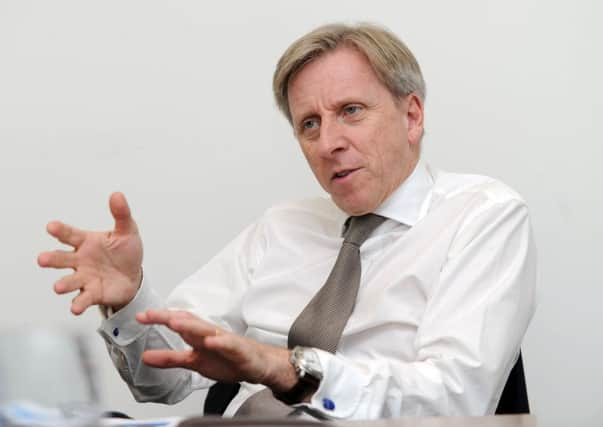Deloitte chief’s support for open market


David Sproul, who is one of Britain’s most powerful business advisers, told the Yorkshire Post that the UK runs “a significant risk if we start becoming very nationalistic either for political or economic reasons”.
Mr Sykes this week announced plans to fund the UK Independence Party’s campaign to fight next May’s European elections.
Advertisement
Hide AdAdvertisement
Hide AdHe also published a YouGov survey claiming that 74 per cent of people living in Yorkshire are opposed to opening up UK borders to migrants from Romania and Bulgaria in the new year.
Mr Sproul said: “Clearly, we need to protect the ability of our own youth and unemployed to get jobs, but generally we will benefit from having an open labour market. If we don’t have an open labour market here and encourage growth here, then that labour will go somewhere else and create growth somewhere else.”
Deloitte is one of the Big Four accountancy firms and advises many of Britain’s top businesses.
In an interview during a visit to Yorkshire yesterday, Mr Sproul acknowledged the concern around the further flux of immigrants, but said the political argument “operates absent whatever the real economic arguments are”.
Advertisement
Hide AdAdvertisement
Hide AdHe said that Britain’s reputation as an open economy attracts a huge amount of business to the UK and warned that a rise in nationalism “will put significant barriers up to that openness of trading that I think will have some unintended consequences that we would feel in the years ahead”.
Steve Almond, global chairman and head of international markets at Deloitte, said he had “huge scepticism” about such polls.
He told the Yorkshire Post that some of the biggest investors in Britain want the country to maintain its openness to immigration.
He also raised concerns about visa issues making it difficult for some foreign investors to even look at the UK.
Advertisement
Hide AdAdvertisement
Hide AdMr Almond said: “We all know from across the world and across history that trade barriers, tariff and national regulations are all inhibitors of economic growth so there are obviously good reasons for being in the EU. It doesn’t mean the EU is perfect.”
Mr Sykes, who developed the Meadowhall shopping centre in Sheffield, said he viewed the forthcoming elections as Britain’s last chance to break free from Brussels.
Prime Minister David Cameron has said he wants to renegotiate Britain’s relationship with the EU and then put it to a referendum.
Mr Sproul said the prospect of a referendum is causing some major investors “pause for thought”.
Advertisement
Hide AdAdvertisement
Hide AdHe added: “The majority of businesses, certainly the ones that speak to us, are very clear that the benefit of Europe is significant and far outweighs any of the costs or disadvantages.
“The overwhelming view of business, and not just large business, is that our contract with Europe can and should be amended, but the value we get from Europe in terms of investment, export market and free flow of goods is significant.”
The two accountants met business leaders and Deloitte staff in Leeds.
Mr Sproul said: “Definitely confidence has come back. It’s spread across the UK and it’s spread across the sectors.
Advertisement
Hide AdAdvertisement
Hide Ad“We have started to see a much clearer signal around investment and acquisitions. Businesses are recognising that growth has to be grasped.”
He dismissed suggestions of regional disparities in economic growth.
Mr Sproul said: “There’s always a suspicion that growth is only happening in the South East. Categorically, it is spread all around the country.”
He said the best businesses have found a niche, an export-led focus and are led by driven, visionary types.
Advertisement
Hide AdAdvertisement
Hide AdBut he warned that there needs to be “a greater sense of ambition” around companies and the Government to help increase ex-ports.
Only 7,500 Yorkshire businesses are exporters, in a total business population of 345,000.
Mr Sproul said there are too many export support schemes and called for companies to get more help on the ground in foreign markets.
Mr Almond said businesses are ready to invest in traditional markets of the UK, Europe and the US as well as developing markets.
Advertisement
Hide AdAdvertisement
Hide AdHe said some emerging market economies lack knowledge-based, project management and technology-driven skills, traditionally the “sweet spot” of British business know-how.
Why the US is so far ahead
THE global chairman of Deloitte has called on British universities to raise their game.
Steve Almond said: “At the heart of Silicon Valley’s success is Stanford University.
“It’s absolutely accepted that if you are a university professor you are also likely to be on one or two boards or engaged in one or two ventures because you are trying to monetise the research.
Advertisement
Hide AdAdvertisement
Hide Ad“The US is way ahead of us. It has built a huge ecosystem and culture that says the purpose of innovation is to add value to the commercial world and society at large, rather than an end in itself.”